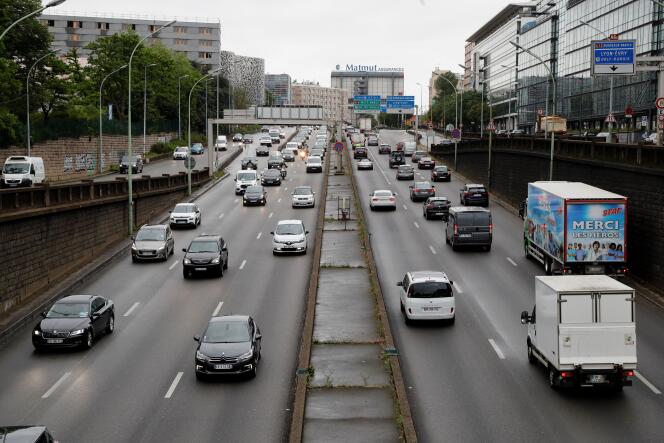The speed will be limited to 50 kilometers per hour (km/h) from September 14, 2024 on the ring road, announced Wednesday, November 22, the mayor of Paris, Anne Hidalgo, during the presentation of the fourth Climate plan from the city. The latter also provides for the exit from fossil fuels and the renovation of public buildings.
“After the Paris Games, from September 14, 2024, the speed will be limited to 50 km/h on the ring road, compared to 70 km/h today. Less environmental and noise pollution, and more safety for users, all good reasons to slow down! Today, the median speed on the ring road is 50 km/h during the day, 30 to 45 km/h during rush hours and 60 km/h at night.affirms the municipality in a communicated published on its site.
The mayor of Paris also approved the postponement until after the Olympic and Paralympic Games (JOP) of the implementation of her limited traffic zone (ZTL) project, which plans to prohibit transit traffic in the center.
Reduce your carbon footprint by 80% compared to 2004
The emissions trajectory presented by the City aims to reduce its direct greenhouse gas emissions to zero by 2050 and to reduce its carbon footprint (including indirect emissions) by 80%, compared to 2004. taking compensation measures for the remaining 20%. An intermediate level, in 2030, sets the objective of halving direct emissions and 40% of the carbon footprint.
In 2021, the last year for which data is available – but still marked by health measures, which reduced activity – the city’s carbon footprint was 18.4 million tonnes of CO₂ equivalent (Mt CO₂ eq), according to the Town Hall, down 35% compared to 2004. Direct emissions were 4.7 Mt CO₂ eq, or 36.5% less than in 2004.
Among the measures announced is the exit from fossil fuels, the main culprits of global warming. The City promises to no longer have a single municipal vehicle with a thermal engine by 2030 and to no longer use fossil fuels (particularly gas) to heat municipal equipment by 2040.
The Town Hall is also committed to having renovated, in 2050, all of its schools and nurseries, in order to reduce their energy consumption and adapt them to scorching temperatures.
Paris, which is preparing to face summers with temperature peaks of 50°C, will also put in place a plan “Big Hot” for homeless people, based on the Great Cold Plans in winter; and “places of refuge” vegetated or underground for the population.
Online courses, evening classes, workshops: develop your skills
Discover
The municipality did not present overall figures for this plan, simply claiming to have invested 10 billion euros since 2014 in the climate transition, and 1.75 billion in 2023. The Climate plan must be definitively adopted by the Council of Paris in spring 2024.
